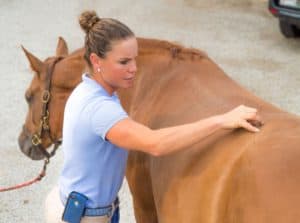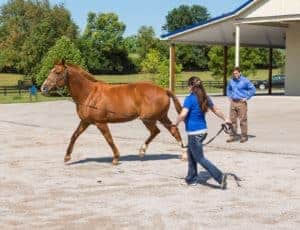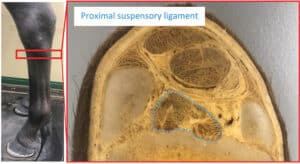
Beneath the Hoof Wall: Soft Tissue Injuries of the Equine Foot
Learn how these injuries happen, how veterinarians treat them, and tips for preventing them in the first place.

Learn how these injuries happen, how veterinarians treat them, and tips for preventing them in the first place.

Scott Anderson, DVM, explains how shock wave therapy can help a suspensory ligament injury heal quickly and successfully.

Two veterinarians share how they diagnose, treat, and rehab back-sore horses.

Modalities ranging from PEMF to vibration plates might help manage equine injury or improve performance.

Researchers are exploring improved ways to heal these notoriously complicated soft tissue structures.

Detecting and managing osteoarthritis in its early stages can go a long way toward keeping your horse sound, comfortable, and happy in his job for years to come.

The approach is a cornerstone in the treatment of dorsal spinous process impingement.

It is important for veterinarians and horse owners to understand the medication rules at high-level competitions when managing pain in equine athletes.

A young Quarter Horse reiner undergoes treatment for a left-hind proximal suspensory ligament injury.

Practitioners use electrotherapy methods ranging from vibration and lasers to shock wave in equine injury rehabilitation.

Jessica Gould, DVM, demonstrates extracorporeal shock wave therapy on an Irish Sport Horse to help manage mild neck and back pain.

Jessica Gould, DVM, demonstrates how she uses shock wave therapy on an older competing Irish Sport Horse.

Jessica Gould, DVM, of Hagyard Equine Medical Institute, explains how extracorporeal shock wave therapy works and what cases she treats with it.

Shock wave therapy is an important tool for helping manage a variety of equine conditions and injuries.

Don’t be caught unaware of the current United States Equestrian Federation guidelines on shock wave.

Bonny Henderson, DVM, CERP, describes how extracorporeal shock wave therapy (ESWT) works to treat and even prevent injuries.
Stay on top of the most recent Horse Health news with
© 2022 Copyright Statement dolor sit amet, consetetur sadipscing User Terms, sed diam nonumy eirmod tempor invidunt ut labore et dolore magna aliquyam erat, sed diam voluptua. At vero eos et accusam et justo duo dolores et ea rebum. Stet clita kasd gubergren, no sea takimata sanctus est Lorem ipsum dolor sit amet.
"*" indicates required fields